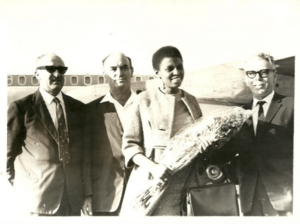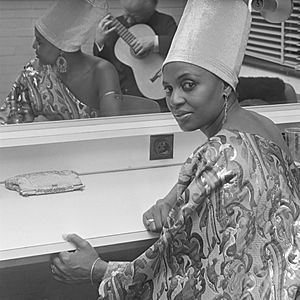Miriam Makeba facts for kids
Quick facts for kids
Miriam Makeba
|
|
|---|---|
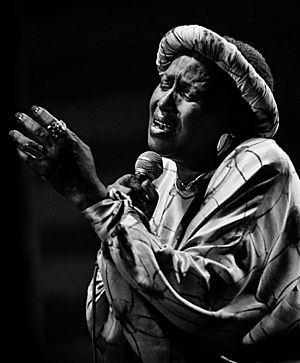
Makeba during a performance
|
|
| Born |
Zenzile Miriam Makeba
4 March 1932 Prospect Township, Johannesburg, Union of South Africa
|
| Died | 9 November 2008 (aged 76) Castel Volturno, Italy
|
| Other names | Mama Africa |
| Occupation |
|
| Years active | 1953–2008 |
| Children | Bongi Makeba |
| Musical career | |
| Genres | |
| Labels |
|
| Associated acts |
|
Zenzile Miriam Makeba (born 4 March 1932 – died 9 November 2008) was a famous South African singer, songwriter, actress, and activist. She was known as Mama Africa. Miriam Makeba used her music to speak out against apartheid, which was a system of unfair racial separation in South Africa.
Born in Johannesburg, Miriam Makeba started working when she was young after her father passed away. She began singing professionally in the 1950s. She performed with groups like the Cuban Brothers and the Manhattan Brothers. In 1959, she appeared in an anti-apartheid film called Come Back, Africa. This film helped her become known around the world. She then moved to New York City, where she became very popular. Her first solo album came out in 1960. Sadly, the South African government stopped her from returning home for her mother's funeral that same year.
Miriam Makeba's career grew in the United States. She released many albums and songs, including her most famous hit, "Pata Pata" (1967). She even won a Grammy Award with Harry Belafonte for their album An Evening with Belafonte/Makeba in 1965. She spoke out against the South African government at the United Nations. She also became involved in the civil rights movement in the US. In 1968, she married Stokely Carmichael, a leader in the Black Panther Party. Because of this marriage, she lost support from some white Americans. The US government later took away her visa, forcing her to move to Guinea.
She continued to perform, mostly in African countries, celebrating their independence. Her music became more critical of apartheid. For example, the 1977 song "Soweto Blues" was about the Soweto uprising. When apartheid ended in 1990, Miriam Makeba returned to South Africa. She kept recording and performing, even appearing in the 1992 film Sarafina!. She became an FAO Goodwill Ambassador in 1999, working for good causes. She passed away from a heart attack during a concert in Italy in 2008.
Miriam Makeba was one of the first African musicians to become famous worldwide. She introduced African music to many people in the West. She also made popular many songs that spoke out against apartheid. She became a symbol of fighting against unfairness. After she died, Nelson Mandela said her music gave everyone a strong feeling of hope.
Contents
Miriam Makeba's Early Life
Childhood and Family
Zenzile Miriam Makeba was born on 4 March 1932. She was born in Prospect, a black township near Johannesburg, South Africa. Her mother, Christina Makeba, was a traditional healer and worked in people's homes. Her father, Caswell Makeba, was a teacher. He died when Miriam was only six years old.
When Miriam was just 18 days old, her mother was arrested. She was jailed for six months for selling homemade beer. Miriam spent her first six months of life in prison with her mother. As a child, Miriam sang in the choir at Kilnerton Training Institute in Pretoria. This was an all-black primary school. She sang in English, Xhosa, Sotho, and Zulu. She later said she learned to sing in English before she could speak it.
After her father's death, Miriam had to find work. She did housework and worked as a nanny. Her mother also worked far from home to support her six children. Miriam lived for a while with her grandmother and many cousins. Her family loved music. Her mother played instruments, and her older brother collected records by artists like Duke Ellington.
In 1949, Miriam married James Kubay. They had their only child, Bongi Makeba, in 1950. Miriam was then diagnosed with breast cancer. Her husband left her shortly after. Years later, she also overcame cervical cancer.
Starting Her Music Career
Miriam Makeba began her professional singing career with the Cuban Brothers. This was an all-male South African group. She sang covers of popular American songs with them. At 21, she joined a jazz group called the Manhattan Brothers. She was the only woman in the group. They sang a mix of South African songs and popular African-American music.
With the Manhattan Brothers, she recorded her first hit, "Lakutshn, Ilanga," in 1953. This made her well-known as a musician across the country. In 1956, she joined an all-woman group called the Skylarks. They sang a mix of jazz and traditional South African melodies. Many of their songs became popular. However, Miriam did not receive any extra money (royalties) from her work with the Skylarks.
In 1955, Miriam met Nelson Mandela, who was a young lawyer at the time. He later remembered meeting her and felt she would become someone important. In 1956, her first solo hit, "Lovely Lies," was released. It was the first South African record to appear on the US Billboard Top 100 chart.
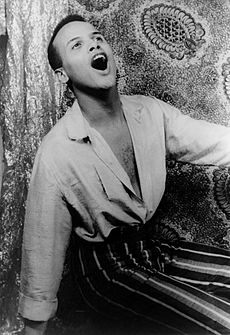
In 1959, Miriam Makeba sang the main female role in a South African jazz opera called King Kong. This musical was performed for audiences of all races, which was unusual then. This helped her become more famous among white South Africans. Also in 1959, she had a small role in Come Back, Africa. This was a film about apartheid made by an American filmmaker. The film had to be made in secret because the government would not have liked it. Miriam sang two songs in the film. Her short appearance made a huge impact on viewers. The filmmaker helped her get a visa to attend the film's premiere in Italy.
Miriam's role in Come Back, Africa brought her international attention. She traveled to London and New York to perform. In London, she met the American singer Harry Belafonte. He became her mentor and helped her with her first solo recordings. These included "Pata Pata" and a version of the traditional Xhosa song "Qongqothwane." "Pata Pata" became her most famous song, even though she thought it was one of her less important ones.
Miriam then moved to New York. She made her US television debut on 1 November 1959. Her first New York concert was soon after. She sang in Xhosa and Zulu, and even a Yiddish folk song. Famous musicians like Miles Davis and Duke Ellington were in the audience. Her performances received great reviews. Belafonte helped her with her first shows in the US.
Life in Exile
In the United States
Becoming Famous
After the Sharpeville massacre in 1960, Miriam Makeba learned her mother had died. When she tried to go home for the funeral, she found her South African passport had been taken away. Two of her family members were killed in the massacre. This made her feel a strong need to help. She felt responsible because she had been able to leave South Africa, but others could not. From this point on, she spoke out more and more against apartheid.
Her music career in the US continued to grow. She signed a contract with RCA Victor. In 1960, she released Miriam Makeba, her first studio album. The album included "Qongqothwane," known in English as "The Click Song." Time magazine called her "the most exciting new singing talent." Newsweek compared her voice to Ella Fitzgerald and Frank Sinatra.
In 1962, Miriam and Harry Belafonte sang at a birthday party for US President John F. Kennedy. Miriam became friends with other African people living in New York. This included Hugh Masekela, whom she married from 1963 to 1968. She also met famous people like Dizzy Gillespie, Nina Simone, and Marlon Brando. She found it hard to live with racial separation in America. She said there was "apartheid in its own way" there.
Travel and Activism
Miriam Makeba's music was also popular in Europe. She traveled and performed there often. In 1962, she visited Kenya to support its independence from British rule. Later that year, she spoke to the United Nations Special Committee against Apartheid. She asked for other countries to stop trading with South Africa. She also asked for a ban on selling weapons to South Africa. She said these weapons would be used against black women and children.
Because of this, her music was banned in South Africa. Her South African citizenship was taken away. Miriam became a person without a country. But she soon received passports from Algeria, Guinea, Belgium, and Ghana. She held nine passports in her life and was given honorary citizenship in ten countries.
Soon after her speech, the emperor of Ethiopia invited her to sing at the start of the Organisation of African Unity. She was the only performer invited. As her ban from South Africa became known, she became a symbol for people who believed in fairness. Her presence in the civil rights movement connected it to the fight against apartheid.
Throughout the 1960s, Miriam became more involved in black political movements. These included the civil rights and Black Power movements. She met the activist Stokely Carmichael. They later married in 1968. Miriam helped raise money for civil rights groups. She also spoke out against unfair laws in the US. Her identity as an African woman helped show that extreme racial discrimination was wrong, both in the US and worldwide.
On 15 March 1966, Miriam and Harry Belafonte won a Grammy Award for their album An Evening with Belafonte/Makeba. This album spoke about the struggles of black South Africans under apartheid. It included songs that criticized the South African government. The album sold very well and made Miriam even more famous in the US. In 1967, her single "Pata Pata" became a worldwide hit.
Moving to Guinea
Miriam Makeba married Stokely Carmichael in March 1968. After this, her popularity in the US dropped a lot. Some people saw her as an extremist. Her concerts were canceled, and news coverage of her decreased. The US government became interested in her activities. The Central Intelligence Agency and the Federal Bureau of Investigation watched her. While she and her husband were traveling, she was stopped from returning to the US. She was refused a visa. So, the couple moved to Guinea. Miriam did not return to the US until 1987.
Guinea became Miriam's home for the next 15 years. She and her husband became close to President Ahmed Sékou Touré. Miriam later said that she had "never seen a country that did what Sékou Touré did for artists." After being rejected by the US, she started writing music that directly criticized the US government's racial policies. She recorded songs like "Lumumba" (1970) and "Malcolm X" (1974).
Miriam performed more often in African countries. As countries gained independence from European rule, she was invited to sing at their independence ceremonies. She also became a diplomat for Ghana. In 1975, she was made Guinea's official representative to the UN. She continued to perform in Europe and Asia, but not in the US. Her concerts in Africa were very popular. During a show in Liberia, the crowd was so loud during "Pata Pata" that she could not finish the song. "Pata Pata" and her other songs were banned in South Africa. During this time, she accepted the nickname "Mama Africa."
In 1976, the South African government made Afrikaans the main language in all schools. This led to the Soweto uprising. Police fired on protesting students, killing many. Hugh Masekela wrote "Soweto Blues" about this event. Miriam performed the song, and it became a regular part of her shows. She separated from Carmichael in 1973 and divorced him in 1978. In 1981, she married Bageot Bah.
Moving to Belgium
Miriam's daughter, Bongi, who was also a singer, died in childbirth in 1985. Miriam became responsible for her two grandchildren. She decided to move out of Guinea and settled in Brussels, Belgium. The next year, Hugh Masekela introduced Miriam to Paul Simon. A few months later, she joined Simon's very successful Graceland Tour. The tour ended with two concerts in Zimbabwe, filmed in 1987.
After touring with Paul Simon, Warner Bros. Records signed Miriam. She released Sangoma ("Healer"). This album featured healing chants and was named after her mother. Her involvement with Simon caused some debate. The Graceland album had been recorded in South Africa, which went against the cultural boycott of the country. Miriam herself supported the boycott.
She also wrote an autobiography called Makeba: My Story. The book described her experiences with apartheid. It was translated into five languages. She took part in the Nelson Mandela 70th Birthday Tribute concert in London in 1988. This concert was watched by 600 million people worldwide. The use of music helped raise awareness about apartheid. A survey after the concert found that many young people knew about Mandela and wanted him released from prison.
Return to South Africa and Final Years
In 1990, the South African government lifted the ban on the African National Congress and other anti-apartheid groups. Nelson Mandela was released from prison in February 1990. He convinced Miriam Makeba to return to South Africa. She did so on 10 June 1990, using her French passport.
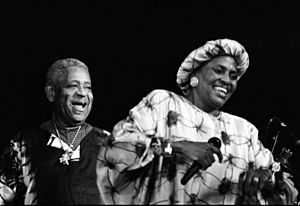
In 1991, Miriam, Dizzy Gillespie, Nina Simone, and Hugh Masekela recorded her album, Eyes on Tomorrow. It mixed jazz, R&B, pop, and traditional African music. It was a big hit across Africa. Miriam and Gillespie then toured the world to promote it. In 1992, she starred in the film Sarafina!. The film was about students involved in the 1976 Soweto uprising. Miriam played the main character's mother, Angelina.
On 16 October 1999, Miriam Makeba was named a FAO Goodwill Ambassador for the United Nations. In January 2000, her album, Homeland, was nominated for a Grammy Award. She worked closely with Graça Machel-Mandela, the South African first lady. They worked to help children suffering from HIV/AIDS, child soldiers, and people with disabilities. She also started the Makeba Centre for Girls, a home for orphans. This was a very special project for her.
In 2005, she announced she would retire and began a farewell tour. Even though she had osteoarthritis, she continued to perform until her death. Her grandchildren and great-grandchild sometimes joined her on stage.
On 9 November 2008, Miriam Makeba became ill during a concert in Italy. The concert was held to support a writer who was speaking out against a criminal group. She suffered a heart attack after singing her hit song "Pata Pata." She was taken to a clinic but doctors could not save her.
Miriam Makeba's Music and Style
Musical Style
Miriam Makeba began her career singing mbube. This was a style of vocal harmony that mixed American jazz, ragtime, and church hymns with African music. She was influenced by South African musician Dolly Rathebe and American jazz singers. Her music was a unique blend of exciting township styles and jazz-influenced ballads.
Miriam released more than 30 albums during her career. Her music changed over time, from African jazz to traditional South African sounds. She is known for her work in world music and Afropop. She also included Latin American music in her performances. She was able to connect with audiences from many different backgrounds.
She was known for her amazing singing voice. She could sing high like an opera singer, but also whisper, roar, and make the special click sounds of the Xhosa language. She sang in English and several African languages. However, she never sang in Afrikaans, the language of the apartheid government. She once said, "When Afrikaaners sing in my language, then I will sing theirs." Her songs in African languages helped show black pride.
Politics and Image
Miriam Makeba said she did not sing political music. Instead, she sang about her life in South Africa, which included the pain of living under apartheid. She once stated, "people say I sing politics, but what I sing is not politics, it is the truth." She used her voice to share the message of fighting apartheid. She performed often for civil rights and anti-apartheid groups. Even her songs that were not directly political were seen as rebellious because they were banned in South Africa. She saw her music as a tool for change. She said, "In our struggle, songs are not simply entertainment for us. They are the way we communicate."
Western audiences often noticed her use of click sounds in songs like "The Click Song." This added to her popularity and her "exotic" image. However, critics sometimes described her in ways that were not respectful. They called her an "African tribeswoman" or an "import from South Africa."
Miriam Makeba was also a style icon. She did not wear makeup and refused to straighten her hair for shows. This helped create a style known as the "Afro look." Her hairstyle represented a "liberated African beauty." She was seen as a beauty icon by South African schoolgirls. She always wore African jewelry. She did not approve of skin-lightening products and refused to advertise them.
Miriam Makeba's Legacy
Musical Influence
Miriam Makeba was one of the most famous Africans in the US. She often represented the continent of Africa to Americans. Her music earned her the nickname "Mama Africa." She was also called the "Empress of African Song" and Africa's "first superstar." Nelson Mandela called her "South Africa's first lady of song." He said her music "inspired a powerful sense of hope in all of us."
Outside of South Africa, Miriam Makeba is known for bringing African music to Western audiences. She helped make world music popular, along with artists like Youssou N'Dour and Angélique Kidjo. Her work with Harry Belafonte in the 1960s helped create the idea of world music. It also showed how diverse African music is. In South Africa, she influenced artists like Thandiswa Mazwai. Many tribute songs were made after she returned to South Africa.
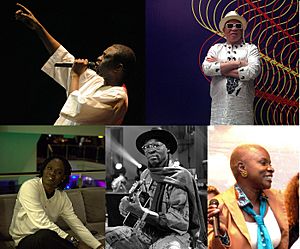
Activism
Miriam Makeba was one of the most visible people fighting against apartheid. She helped make several anti-apartheid songs popular. Because she was so famous, she became a spokesperson for Africans living under unfair governments. When the South African government stopped her from entering her home country, she became a symbol of "apartheid's cruelty." She used her fame to speak out against apartheid at the UN in 1962 and 1964. Many of her songs were banned in South Africa. This meant her records were shared secretly. Even her non-political songs were seen as rebellious. She became a symbol of resistance to the white-minority government.
Miriam Makeba also supported the movement against colonialism. She supported the civil rights and black power movements in the US. She called for black people around the world to unite. She said, "The struggle is no different in South Africa, the streets of Chicago, Trinidad or Canada. The Black people are the victims of capitalism, racism and oppression, period." After marrying Stokely Carmichael, she often appeared with him during his speeches. She helped show that "black is beautiful." Along with other performers like Nina Simone, she used her position to fight for civil rights.
Awards and Recognition
Miriam Makeba's 1965 album with Harry Belafonte won a Grammy Award. This made her the first African recording artist to win this award. She also won the Dag Hammarskjöld Peace Prize in 1986. In 2001, she received the Otto Hahn Peace Medal in Gold for her work for peace and understanding. She also received several honorary doctorates. In 2004, she was voted 38th in a poll of 100 Great South Africans.
From 25 to 27 September 2009, a TV show called Hommage à Miriam Makeba was held in Paris. It was a tribute to her. A documentary film about her life, titled Mama Africa, was released in 2011. On 4 March 2013, and again on International Women's Day in 2017, Google honored her with a Google Doodle on their homepage. In 2014, a square in the Belgian city of Ghent was named "Miriam Makebaplein" after her. In 2020, Time magazine named her "woman of the year" for 1967.
In 2016, the French singer Jain released a tribute song called "Makeba." A musical about Miriam Makeba, titled Mama Africa, premiered in South Africa in 2016. It was also performed in the US. The musical returned to South Africa in February 2017 for what would have been Miriam's 85th birthday. The American-born African jazz singer Somi wrote a play about Miriam Makeba, Dreaming Zenzile, which premiered in 2021. She also released a tribute album dedicated to her.
Notable Songs and Albums
This is a list of some of Miriam Makeba's important albums and songs.
- Albums
- Miriam Makeba (1960)
- The Many Voices of Miriam Makeba (1962)
- An Evening with Belafonte/Makeba (1965)
- Comme une symphonie d'amour (1979)
- The Queen of African Music (1987)
- Sangoma (1988)
- Welela (1989)
- Eyes on Tomorrow (1991)
- Homeland (2000)
- Songs
- "Lakutshn, Ilanga/Lovely Lies" (1956)
- "Sophiatown is Gone"
- "The Click Song" / "Mbube" (1963)
- "Pata Pata" (1967)
- "Lumumba" (1970)
- "Malcolm X" (1974)
- "Soweto Blues" (1977)
- "Thula Sizwe/I Shall Be Released" (1991)
- "Malaika"
See also
 In Spanish: Miriam Makeba para niños
In Spanish: Miriam Makeba para niños
- Culture of South Africa
 | Tommie Smith |
 | Simone Manuel |
 | Shani Davis |
 | Simone Biles |
 | Alice Coachman |


